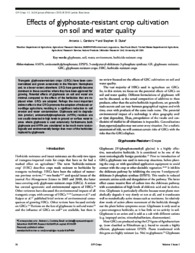Effects of glyphosate-resistant crop cultivation on soil and water quality.
Effects of glyphosate-resistant crop cultivation on soil and water quality.
Author(s): CERDEIRA, A. L.; DUKE, S. O.
Summary: Transgenic glyphosate-resistant crops (GRCs) have been com- mercialized and grown extensively in the western Hemisphere and, to a lesser extent, elsewhere. GRCs have generally become dominant in those countries where they have been approved for growing. Potential effects of glyphosate on soil and water are minimal, compared to the effects of the herbicides that are re- placed when GRCs are adopted. Perhaps the most important indirect effect is that GRCs crops promote the adoption of re- duced- or no-tillage agriculture, resulting in a signifcant reduc- tion in soil erosion and water contamination. Glyphosate and its degradation product, aminomethylphosphonate (AMPA), residues are not usually detected in high levels in ground or surface water in areas where glyphosate is used extensively. Furthermore, both glyphosate and AMPA are considered to be much more toxico- logically and environmentally benign than most of the herbicides replaced by glyphosate.
Publication year: 2010
Types of publication: Journal article
Unit: Embrapa Environment
Keywords: Environment, Glyphosate, Herbicide-resistant crops, Resistência a herbicida, Soil, Water
Observation
Some of Embrapa's publications are published as ePub files. To read them, use or download one of the following free software options to your computer or mobile device. Android: Google Play Books; IOS: iBooks; Windows and Linux: Calibre.
Access other publications
Access the Agricultural Research Database (BDPA) to consult Embrapa's full library collection and records.
Visit Embrapa Bookstore to purchase books and other publications sold by Embrapa.

